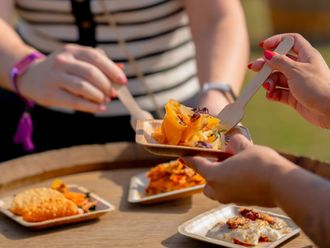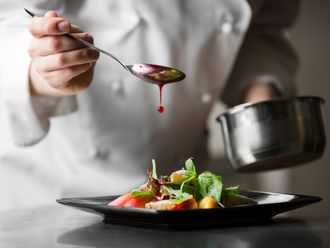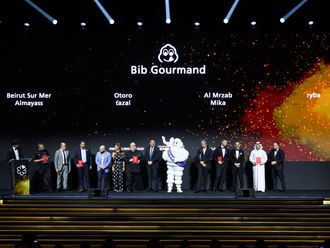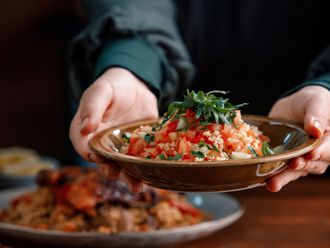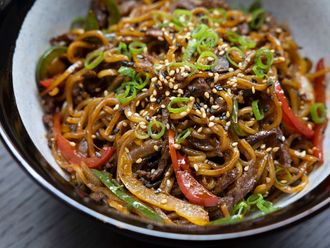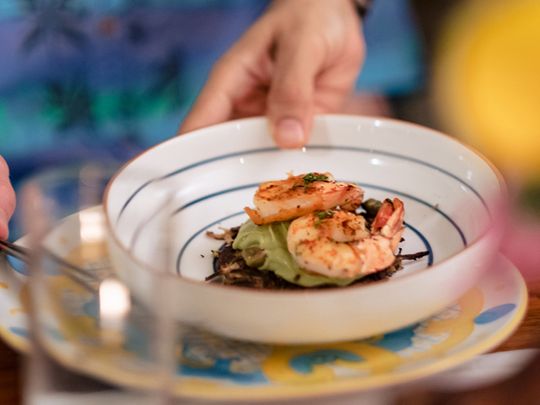
In a little apartment of a Dubai skyscraper, eight strangers sit around a dinner table. It is evening and soft music wafts through the warmly lit room, a crackling fireplace shown on a large LED TV screen in the background. An Instagram post brought them together - the promise of a special culinary journey.
It is a boat ride down the Mekong River in East Asia and the cuisines of the six countries it passes through – a 9-course menu to honour the mighty ‘Nine-dragon’ river.
The host? A corporate employee by day, and Madame Vo, supper club host by night. As each course arrives, garnished with cultural stories of origin that pay homage to her Vietnamese-German roots – there are expressions of delight, wondering questions at the experimental dishes and slowly drawn out in lively conversation are memories of food, tales from home and family and travel. A couple of icebreaker questions are written on the menu, to help.
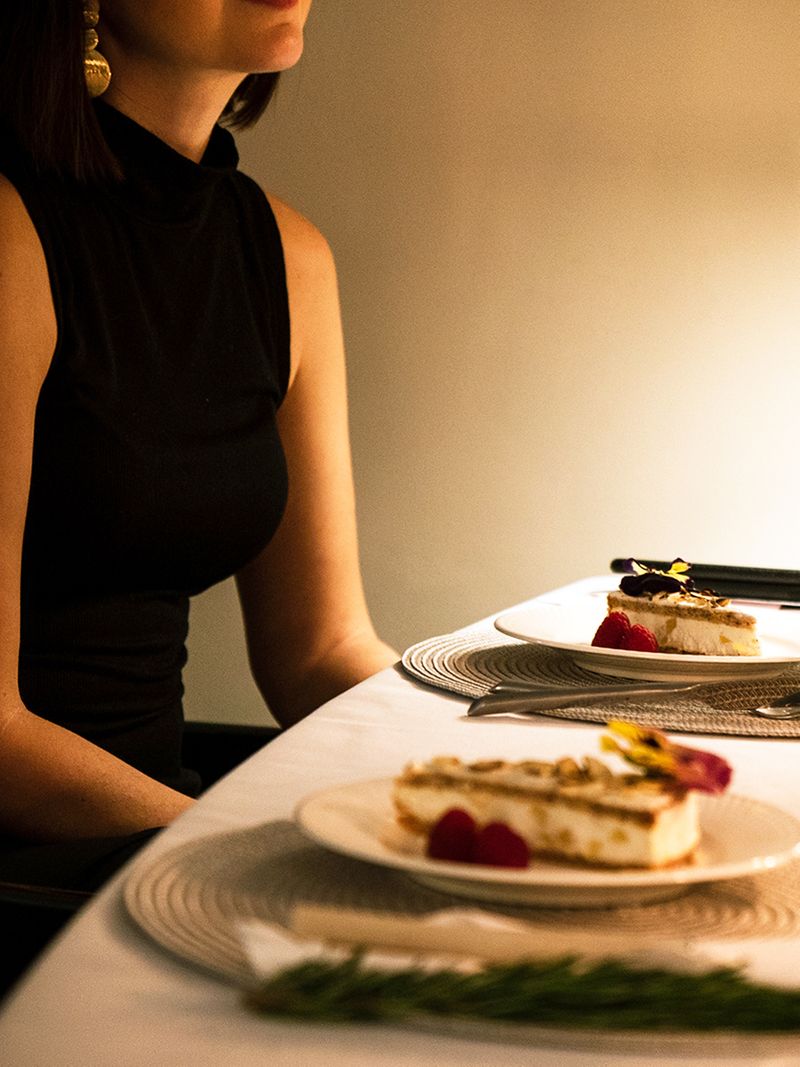
After plates of Prawn Jiao Zi, Cha Gio, Madame Vo’s tale is of 1900s colonised Vietnam: “The French brought with them something that they call the mighty baguette - we discovered that they’re made out of cheap, readily available ingredients that are also very filling. So very soon, the baguette became a staple in a dish you might know as… Banh Mi! French baguette with Vietnamese spices, herbs and meat.”
As the night deepens, a guest plays the guitar softly.
Supper clubs – finding friends, love and exquisite food
Scores of homes across the UAE come alight with a similar journey each week – a chef or home cook at the helm, the passengers sometimes unaware of where they’re headed.
“Eight people at a table or 16 people in a room have a sense of adventure like, ‘Oh, we're going to travel together to the Caribbean, but we don't have to move an inch – because he’s going to take us’,” says Chef Kuv Sharma of ‘Kuv’s Secret Suppers’, a weekly Dubai-based supper club that started back in 2015.

Eight people at a table or 16 people in a room have a sense of adventure like, ‘Oh, we're going to travel together to the Caribbean, but we don't have to move an inch – because he’s going to take us.
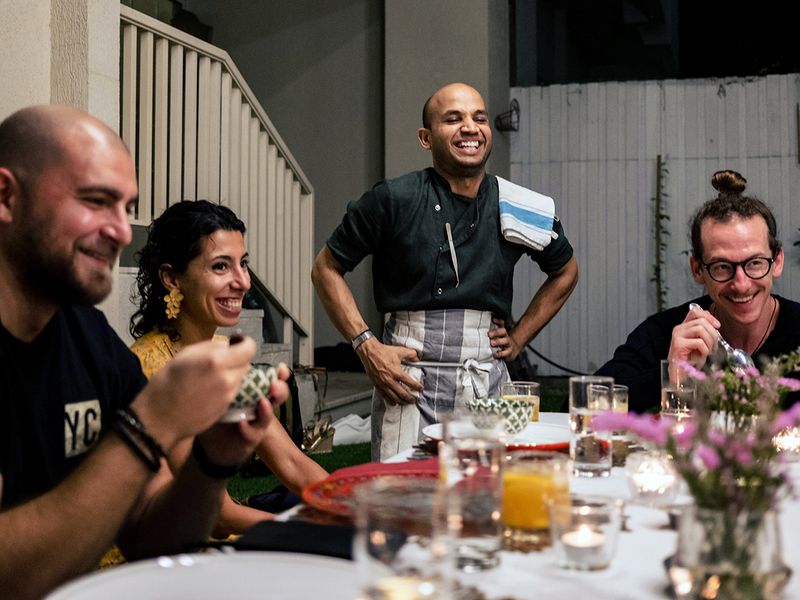
The destinations are different – Chef Sharma, who hails from London, chooses a completely new cuisine for every single month, spending three to four months to research the culture, history, geography of the place and design an offbeat, experimental menu tied to a narrative for his guests. Jamaican, Korean, Moroccan and Iranian are just some of the 121 cuisine deep dives (or ‘Kuvisines’ as they are fondly called) he’s taken his guests on so far.
For Chef Ahmed Halawa, host of his own supper club at his home in Dubai, you are transported to the family dinner tables of the Levant for a hearty feast.
With every supper club, you can guarantee three things – a homely atmosphere, stand-out, often-experimental dishes with their stories and a brilliant opportunity to meet people who love food.
Ally Landes, 45, a British expat who regularly attends them says, “For us, supper clubs are amazing experiences because we end up meeting people we’ve never met before. You end up having something in common - you all love food. Everyone on that table loves to eat.

For us, supper clubs are amazing experiences because we end up meeting people we’ve never met before. You end up having something in common - you all love food. Everyone on that table loves to eat. It’s a table for 8, a table for 10 or 12 max at some chef or cook’s house, and the chef will tell you their story, so it’s a really personal experience.
“It’s a table for 8, a table for 10 or 12 max at some chef or cook’s house, and the chef will tell you their story, so it’s a really personal experience. When you go to restaurant, you’re going with 3 or 4 people that you know, you’ve booked a table, you won’t meet anyone else in that restaurant.
“This is a very intimate dining experience, and you’re all going to talk about food – that’s why supper clubs are so special. It’s a really, really great experience if you love to eat.”
Supper clubs costs range from around Dh250 to Dh500 for a three-hour multicourse meal along with live music and entertainment sometimes. They are often Instagram accounts where you can message the host to express interest in attending the dinner.
What are supper clubs?
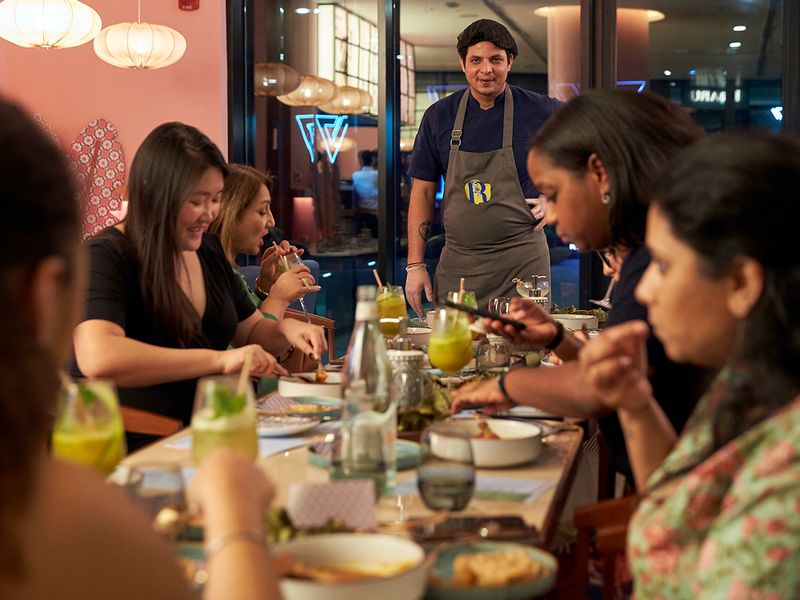
Traditionally, they were an anti-mainstream, underground dining phenomenon where home cooks and chefs would charge their friends, neighbours or strangers for a special dinner. Now, even restaurants have hopped onto the idea – holding occasional pop-ups or supper clubs.
Hersh Suri, owner of Roobaru restaurant, Dubai, that now has a weekly supper club for 10, to eat an 8-course meal, says, “It’s a really cool way to try new food. I think sometimes you can get lost in these high-end large-scale operations and supper clubs are such a lovely alternative to that, because you can really get to know the people you’re sitting with, meet new people and understand your food – chef (Chef Gaurav Yadav) will really provide an explanation. People deserve to know where they’re eating, what they’re eating and where it comes from.”
‘Pop-up restaurants’, ‘secret restaurants’, ‘supper clubs’, ‘guerilla dinner’, ‘paid dinner parties’, ‘speakeasies’ – supper clubs have been around for more than a hundred years, under different names.
In the 1930s US, it was Prohibition era when roadhouses or inns hosted such evenings. As per a 2014 study by a PhD student at the Dublin Institute of Technology - and London as well, the ‘Half Hundred club’ was a supper club, with the tagline ‘good food and great company’ where suppers were held in strange locations like the London Zoo.
‘Puertos cerradas’ or ‘closed-door’ underground dining experiences were part of Latin American culture too, and China’s ‘Si Fang Cai’ or ‘private room dishes’ are known for their excellent food.
It’s a really cool way to try new food. I think sometimes you can get lost in these high-end large-scale operations and supper clubs are such a lovely alternative to that, because you can really get to know the people you’re sitting with, meet new people and understand your food – chef (Chef Gaurav Yadav) will really provide an explanation. People deserve to know where they’re eating, what they’re eating and where it comes from."
UAE’s vibrant supper club scene: Homes, restaurants and a Michelin Bib Gourmand
Where do supper clubs fit into the food scene? In Dubai’s melting pot of cultures, it has become an empowering way for home cooks and chefs to begin a full or part-time business giving special dinners at home and often representing their own cultures.
The story of UAE’s supper clubs begins back in 2012 – when two Emirati childhood friends, Buthaina Al Mazrui and Alamira Noor Bani Hashim founded ‘The Dinner Club by No. 57’, an exclusive supper club that gave special multicourse menus in unusual locations. Think – a stripped down Roads Transport Authority bus, a recreated supermarket aisle, an underground security box at the Louvre.
Over time, it became an exclusive, invite-only monthly event and was very successful – later transforming into No. 57 Boutique café in Abu Dhabi. Others came up soon after – Lime and Tonic, again themed supper club evenings, and then in the classic model – ‘Kuv’s Secret Suppers’.
Why I find them so exciting is that people get to display a bit of their homes. Dubai is a place where we carry a little bit of home with us, and it makes sense to display them in a supper club.
“Why I find them so exciting is that people get to display a bit of their homes. Dubai is a place where we carry a little bit of home with us, and it makes sense to display them in a supper club,” says Chef Sharma.
The ‘Girl and The Goose’ is a culinary trip to Nicaragua by Gabriella Chamorro, Nahla Tabbaa draws on her Bangladeshi-Jordanian heritage to give an art-inspired supper club experience. ‘The Table Project’ specialises in Memoni cuisine. Alserkal Avenue’s ‘INKED’ hosts offbeat dinners. Now, an app, Break Bread gives you the option to choose from a wide range of supper club chefs on the platform.
Each supper club has ripple effects – inspiring other passionate cooks to begin their own journeys. Noorin Ansari, 33, an Indian expat who has visited many supper clubs and now has a catering cook delivery service, Chula, recounts meeting the future creator of the supper club CASA 21, Jatin Suri, one evening: “Actually, I met him at one of the supper clubs – ‘The Girl and the Goose’. He was with a group of friends and they were talking – his friends said, ‘Why don’t you start something like this?’ He was like ‘Oh no, I never could,’ but two months later I got a message from Jatin saying, ‘I’m going to try this out, and would like to invite you. It was a five-star fine dining kind of meal – beautiful, with lots of gastronomic flair.”

I met him at one of the supper clubs – ‘The Girl and the Goose’. He was with a group of friends and they were talking – his friends said, ‘Why don’t you start something like this?’ He was like ‘Oh no, I never could,’ but two months later I got a message from Jatin saying, ‘I’m going to try this out, and would like to invite you.
Even Chef Halawa says part of his inspiration was the Dinner Club 57, and ‘The Story of Food’ by Neha Mishra, which took off as a supper club specialising in ramen, that became the Izakaya restaurant ‘Kinoya’ years down the line – and recently won a Michelin Bib Gourmand. He says, “It looked so nice to do like all these exotic dinners and it kind of inspired me as well but I did my own way basically – my table is a family table.”
“The truth is, at the moment, the supper club is a model that anyone could play into. If you want to do it for a hobby, you can do it as a hobby, you can do it like a weekend thing – or once in a blue moon,” adds Chef Sharma.
Secrecy, social media and the pandemic
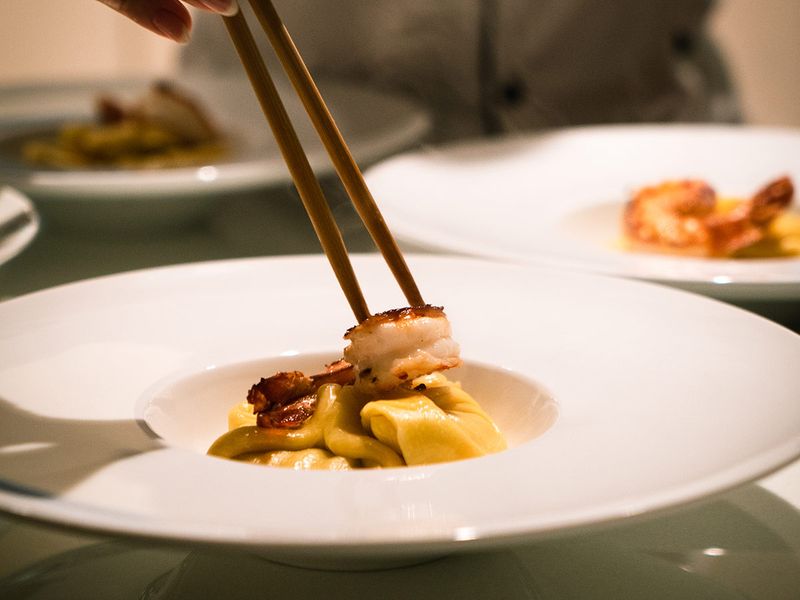
Part of the appeal is the secrecy. Meet Meet Hawkerboi, the culinary ‘Banksy’, an anonymous supper club host in Dubai known for brilliant South East Asian street food dinners that are announced on social media, sold out in minutes and completely secret.
“Everyone is just in search of something exclusive and cool that no one else has access to, you’ll post about a supper club, and people are like ‘Oh, where’d you go?’ There is a social media catch here – yeah I went to this random person’s house and ate food, it was amazing,” explains Suri, who also made lasting friends at Hawkerboi’s and had attended many supper clubs back in England where he lived for a decade.

Everyone is just in search of something exclusive and cool that no one else has access to, you’ll post about a supper club, and people are like ‘Oh, where’d you go?’ There is a social media catch here – yeah I went to this random person’s house and ate food, it was amazing.
The pandemic had two opposing effects – as people hesitated to eat with strangers, pandemic epiphanies gave some courage to turn their love for food into a supper club, ‘Haus of Vo’ being one such case, which Vo calls her ‘side hustle’ now.
“I have noticed that supper clubs have increased in the past two and half years. A lot of people have been inspired to do more in their free time, whether they’re supper clubs or other businesses,” says Chef Halawa.
The pandemic also saw existing supper clubs opt for home delivery, sometimes paired with organising a virtual meet at the usual time – as ‘Kuv’s Secret Suppers’ did.
Joining a food-loving multicultural community
“Beyond the food - in the true spirit of a supper club, it’s also about making new connections, gaining fresh and new perspectives,” says Vo.
“There are 60 to 70 people who come to my home for the first time every month. It’s a sense of adventure,” says Chef Sharma. “I don’t actually know who’s going to turn up at my house - 50 per cent are regulars, who’ve been to the suppers several times – they’re so well versed with the game and everything. Everybody is a host in a different way – they become co-hosts.”
When you enter the world of supper clubs, you will find a community of foodies with whom you can attend more supper clubs as well. Niketh Pillai, 33, an Indian expat, tried supper clubs on recommendations from friends, looking for something new after being well versed in the restaurant scene of Dubai, “It was a homely, cozy environment – it’s like going to a friend’s place and talking to them. The host made sure that my wife and I didn’t sit together, to your left and right, there is somebody totally new. The food has to be really good, that's what the supper clubs are nailing.”

It was a homely, cozy environment – it’s like going to a friend’s place and talking to them... The food has to be really good, that's what the supper clubs are nailing.
Chef Maria Theresa De Lima loves the intrigue, surprise and cultural experience. She’s been to Hawkerboi’s secret dinner and ‘Three Chefs Dinner’ organised by FoodDiva: “As a chef myself, I can taste that the food was prepared and cooked with passion. I love the total experience, from finding the secret location, the mysterious chef, excellent food and surprise dishes.”

As a chef myself, I can taste that the food was prepared and cooked with passion. I love the total experience, from finding the secret location, the mysterious chef, excellent food and surprise dishes.
For Ruby Djordjevic, 29, a British expat who moved to the UAE last year and found herself lonely in a big, new city, going to supper clubs was a great way to make friends. She says, “I thought, ‘I’ll go meet new people, I’ll enjoy the food, have good conversation.’ I highly recommend – if you love food or a specific culture, it’s almost like a deep dive into that country.”

I thought, ‘I’ll go meet new people, I’ll enjoy the food, have good conversation.’ I highly recommend – if you love food or a specific culture, it’s almost like a deep dive into that country.
“They break bread together. I think that’s the best way to get to know someone – over a meal,” says Chef Halawa.
Love is in the air as well at some supper clubs. At ‘Haus of Vo’, once a month Madame Vo also hosts a ‘Singles Night’ for those looking to meet new people – where guests are matched based on age and interests. She says, “I've already secured a few success stories in my track record, and it just makes these supper club evenings extra rewarding.”
Not only have countless friendships risen, but two couples found their lifelong partners at Chef Sharma’s table as well. One pair got married recently, and Chef Sharma couldn’t attend due to an ill spell, much to his disappointment.
“I’ve just asked for a small favour to compensate – to name their first-born after me,” Chef Sharma laughs. “So, you can expect a little Kuv at some point.”
Why become a supper club chef?
“When someone cooks for you, they are saying something. They are telling you about themselves: Where they come from, who they are and what makes them happy.” - Anthony Bourdain, American celebrity chef, author and documentarian
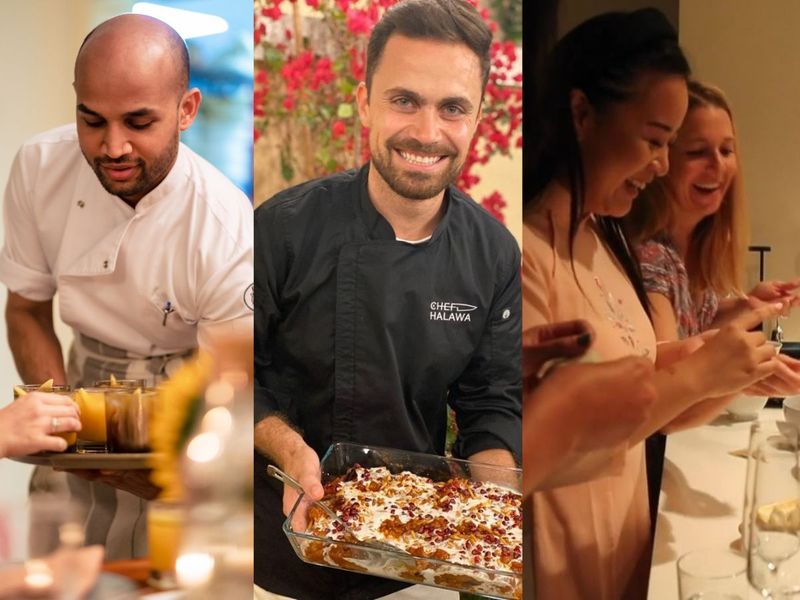
At the heart of every supper club, is a passionate chef with a story to tell through their cooking. They take you on a limited-edition culinary trip with the full heritage tour included – you travel the world from the comfort of (someone else’s) home. Supper club chefs can often be self-taught as well, testing and researching recipes on their own – and making the most of seasonal ingredients.
For Vo, a child of restaurateurs, cooking had always been a safe space – and during the pandemic, she decided to give wings to her life-long dream of being a food entrepreneur. She says, “I grew up in the kitchen. I cook to seek refuge from the hectic pace of life, to nurture friendships and to battle the occasional homesickness.
“As the child of restauranteurs, my immigrant parents bestowed upon me the qualities of discipline, loyalty and honour. Cooking brings me closer to them and serves as a reminder never to forget my humble roots.

“Marrying the two things I love, to connect people over good food, was an obvious match. I discovered the power of cooking in nurturing a community and in sparking meaningful conversations.
“Marrying the two things I love, to connect people over good food, was an obvious match. I discovered the power of cooking in nurturing a community and in sparking meaningful conversations.” During the winters, she draws inspiration from Europe’s festive markets – with cinnamon and burnt apples, and this summer is the Mekong menu.
For restaurants, it offers a creative freedom for chefs. Suri says about the Roobaru chefs, “Sometimes, I look at them and they have so many great ideas but you can only put X things on a menu… Chef was so happy when we came up with this idea because we could do so much.”

We also have the freedom to be as creative as we want as the menu doesn’t have to be within the LOWE concept. It’s also a great opportunity to train and educate our team on new ingredients, recipes and techniques.
LOWE, a sustainability-oriented Dubai restaurant that’s part of the city’s Michelin Guide had begun pop-up supper clubs back in July 2020 to great success, Kate Christou, Chief Operating Officer, tells us. She says, “We also have the freedom to be as creative as we want as the menu doesn’t have to be within the LOWE concept. It’s also a great opportunity to train and educate our team on new ingredients, recipes and techniques.
The chefs' perspective ...
Around the world in 121 menus with Chef Kuv
A secret menu. Three questions that cannot be uttered at the table until the main course: ‘What do you do? Where are you from? How long have you been in Dubai?'
"You also carry an object that has a story attached to it – so it’s like a show and tell sort of thing,” says Chef Sharma. “There’s no expectation, you’re only expected to come and follow these rules.”
He reveals the location 24 hours before the dinner, the guests arrive – sometimes in themed cultural clothing – and the culinary bard begins his tale.
“The menu is called ‘Between Oceans’. It’s a beautiful story between one person and their beloved, and how some instances make them drift apart. It’s also inspired by maritime adventures as well of people 2500, 3000 years ago,” he says. He narrates the ancient Tamil epic of ‘Silapathikaram’ (The Tale of an Anklet), having left the ‘Silambu’ or a thick silver anklet or bangle on the table as a symbol from the story for his Emirati, Chinese, American, Omani and Indian guests.
“I encourage you to be as comfortable as you’d like to be. This is your home for the purpose of this dinner,” Chef Sharma continues. As a trained classical singer, sitar player, dancer and actor, he also puts on a live music show sometimes.
Although Chef Sharma loved cooking from as young as 10, he was originally an architect by profession. After he had moved to Dubai soon after the passing of his mother, he found himself cooking a lot for himself and others, “I went into the kitchen to self soothe, to preserve some memories and recipes. Many of my memories of her were in the kitchen.”
His friends signed him up for a website for private cooks as a joke. “I would often go into people's homes, and they would hire me to cook say Italian food or French food or like Spanish food… my idea, then, when the dinners really sort of started picking up pace, was to create a community space where people feel safe to share.”
It wasn’t easy – from having to continue the evening after crying in the kitchen at the 4th course of his first supper club-style evening, getting a third of his thumb cut off in a mandoline slicer, a singed hand from hot oil to when a valuable family heirloom was stolen - the show must go on.
“I've done suppers on the back of a surfboard.” He would lug boxes of plates, cutlery, glasses and even a portable table at a point as he held suppers in different friends’ houses who might or might not have the right equipment but wanted to host an evening. A friend of his had only a single pan in his house.
Chef Sharma says, “It’s quite simply really, my intention is that every month the ingredients must change, the flavour palette must change so that every time they come back or are around the table, they have a different culinary experience from the previous month.
“I would tell the story of Korean food as with as much love as I will tell the story of Rajput food from my mum's side of the family. It’s the same respect with each cuisine.”
His menus are social commentary as well. He says, “Whether it’s architecture, whether it’s any other form of expression I use in my life, I want to explore something that’s slightly different. And I want to respectfully sort of pack people on the same journey if possible.” Now, he also works with restaurants for events and to design menus.
‘A Night in Palestine’ with Chef Halawa
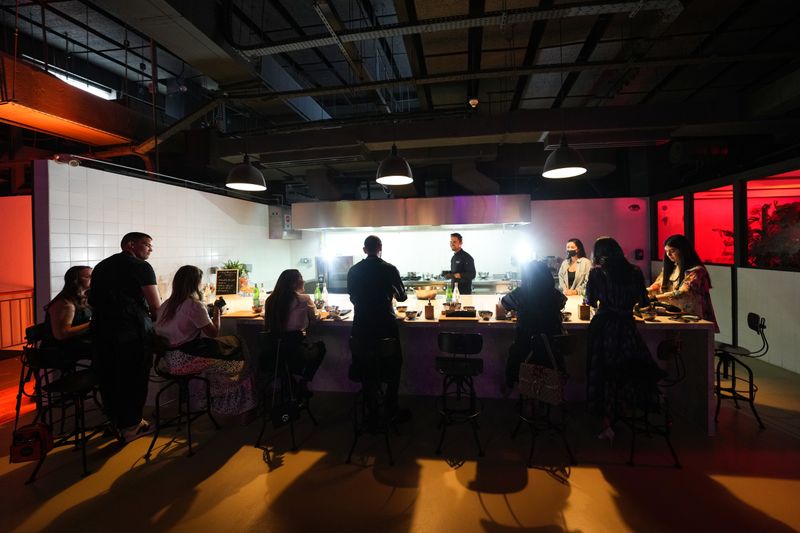
In a candlelit townhouse in Jumeirah Village Circle, a dish that was born in the ‘dessert or sweet capital’ of Palestine, Nablus, comes to life under the expert hands of Chef Halawa. We’re talking heavenly bites of sweet, cheesy Kunafa cooked in front of you, along with the ancient tale of its origin.
With high-tempo Arabic music playing in the background, guests enjoy steaming plates of rich Maaloubhe (‘Upside Down’, a rice-based dish that has eggplants and lamb, and is flipped over on a large tray), Musakhan – spiced sumac chicken over taboun bread amongst others. The menu is a secret, varying based on seasonal produce and guests often arrive for culinary surprises.
“It’s a replica of how we ate at home, we were a big family – with seven people. So my mum, God bless her, had to cook for a very large number every day,” says the 33-year-old Palestinian expat who grew up in Jordan and was previously a marketing consultant.
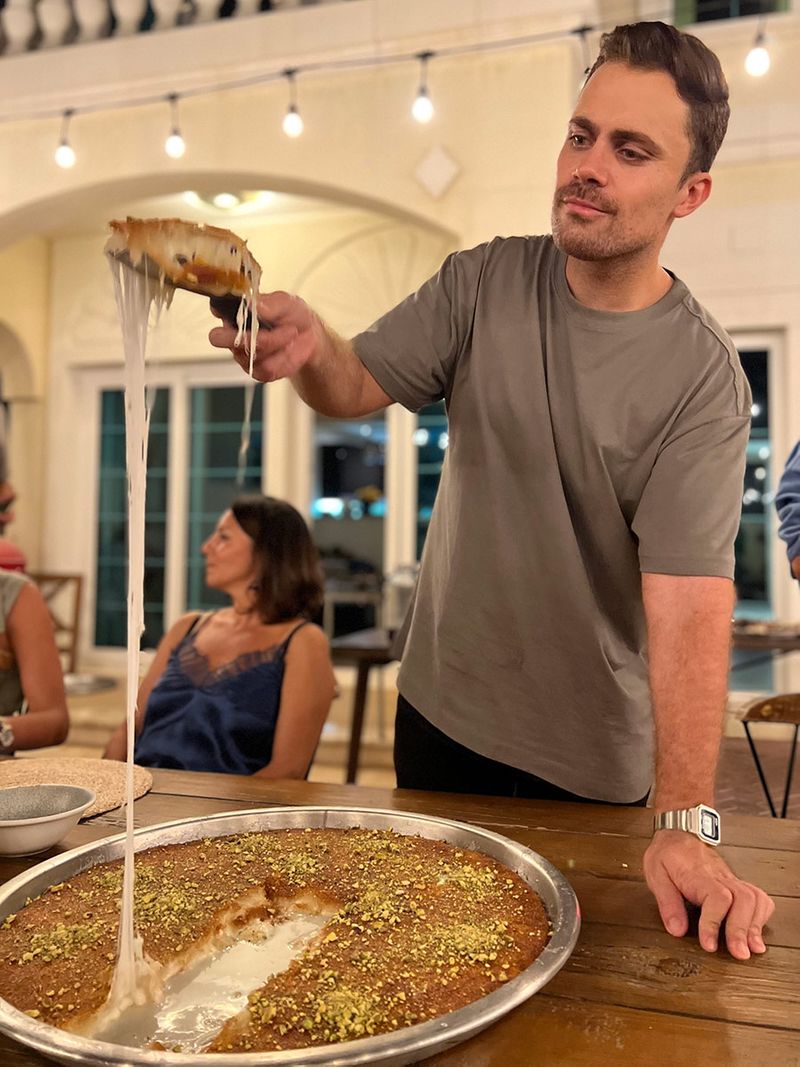
He credits his parents for his deep love of cooking – his father was also a creative, experimental chef who would offer his family tastes of countries they’d never been to with his dishes. “At the same time, I always liked entertaining. I like hosting dinner parties and even music parties at my house. So, it just worked for me and I have the skill to cook since I was very young,” says Chef Halawa.
End of 2019, just before the pandemic hit – he began his supper club dinners every Saturday, balancing it with work. The first ones were held at the homes of two friends, and family and friends attended – but later, he had moved into a villa and held them at home. “By the third and fourth and fifth week, it was mainly strangers in my house … it felt so thrilling. It was a very nice feeling – that these people are here for my food and experience,” says Chef Halawa, who is now a full-time chef and works at pop-up events as well.
On the day, he wakes up at 8:30am, sometimes shopping on the same day – going to different spots, and then cooks all day until the evening, balancing the preparation of five to six dishes at the same time. Along with tales of Palestine and Nablus, his hometown, he also hands out the famous Nabulsi olive oil soap that the city has been selling for hundreds of years.
“Kunafa was created in Nablus, same for many desserts like Kollaj, amongst many other dishes. My ultimate vision is for guests to get to know more about the Palestinian cuisine,” says Chef Halawa.
Chef Sharma says, “What I really see this grow into is a cultural exchange, where the cook gets to cook their grandmother’s recipes or give personal stories that showcase their cultures.”
Back at Haus of Vo, although any social ice had melted 15 minutes into the dinner, someone gestured at the questions written down to help, “What made you smile recently?”
A guest smiles, “This dumpling.”
- Input by Evangeline Elsa, Social Media Editor



